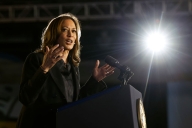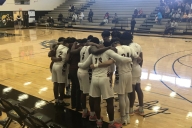You have /5 articles left.
Sign up for a free account or log in.
About 20 percent of the information the National Collegiate Athletic Association gathered in its investigation of the University of Miami has been thrown out because it was improperly obtained, officials said Monday, and the breaches of conduct reached all the way up to the (now-fired) head of NCAA enforcement.
The NCAA announced around noon on Presidents' Day that it would release the findings of an external review of its handling of the Miami investigation that afternoon, three weeks after NCAA President Mark Emmert said he'd discovered "a severe issue of improper conduct" on the part of his staff. At issue was the employment of Maria Elena Perez, the lawyer for the Miami booster Nevin Shapiro, who over the course of several years allegedly gave cash and gifts to dozens of Miami athletes and recruits in violation of NCAA rules.
As detailed in the report, the NCAA paid Perez $18,000 (though Perez billed the association for more than $57,000) after they arranged to subpoena and depose witnesses during Shapiro's bankruptcy proceedings. While no laws or NCAA rules were technically broken, the report found, the investigators' actions were "unseemly," went beyond expected and acceptable NCAA practice, and "could be perceived as a manipulation of bankruptcy proceedings." The NCAA does not have subpoena power.
The report's release clears the way for the NCAA's Committee on Infractions to penalize Miami, but the verdict will not take the deposed information into account because the NCAA would not have had access to the information had it followed appropriate procedure. The committee is expected to hand down its penalties soon. Emmert said the report does not taint the forthcoming infractions or other NCAA investigations.
Miami President Donna Shalala said in a statement Monday night that the the university "has suffered" and was "wronged" in the investigation, and should not suffer additional penalties beyond those it has already self-imposed. She recalled pledging vigorous pursuit of the truth and "complete, honest, and transparent cooperation with the NCAA."
"The University of Miami has lived up to those promises, but sadly the NCAA has not lived up to their own core principles," Shalala said. "Regardless of where blame lies internally with the NCAA, even one individual, one act, one instance of malfeasance both taints the entire process and breaches the public’s trust."
Monday's news that the former vice president of enforcement Julie Roe Lach was no longer employed by the NCAA doubled the number of people who were let go during the Miami investigation. The enforcement director, Ameen Najjar -- who proposed retaining Perez (at her suggestion) and led the investigation -- had already been fired.
(Editor's note: The above paragraph has been updated from a previous version.)
Internal NCAA policy gives the association's legal staff sole authority to retain and monitor legal counsel. After Chief Operating Officer Jim Isch gave Lach the green light to approve the payment for Perez, Najjar sought legal approval at Lach's request, but was turned down and lied about it when Lach and managing director of enforcement Tom Hosty followed up, they said. (Najjar denies this.)
Still, enforcement managers "exercised insufficient oversight" of the process, the report says. It also notes that staff "did not sufficiently consider the membership's understanding about the limits of enforcement staff's investigative powers."
Jonathan Duncan, a law partner who has worked on NCAA issues for 15 years, has been tapped as interim vice president of enforcement.
The external report by Kenneth L. Wainstein, a Washington lawyer, does not signal the end of the probe into NCAA enforcement. Emmert said Monday that the next stage is a broader review of enforcement's environment, policies and procedures. Emmert said he will also "take a broader look" at the association's regulatory systems, and solicit feedback from member institutions about what they expect of the national office. The NCAA will not delve into any investigations of colleges that it has already closed, unless evidence of similar misconduct surfaces.
Asked repeatedly on a call with reporters Monday whether he should take any personal responsibility for the ordeal, Emmert deferred to the NCAA Executive Committee, the 17-member group of college presidents to which he reports.
"If they believe that action should be taken toward me or anyone else in the organization, then they're free to do that," Emmert said. "I think the actions that we're taking today are clearly consistent with principles of holding people accountable for their behavior."
The executive committee's chair, Michigan State University President Lou Anna K. Simon, had this to say in an NCAA news release: “Our expectation is that the NCAA uses this review as a launching point for meaningful change. Moving forward, NCAA member schools must engage in a healthy debate about our desired outcomes and expectations of the Association’s regulatory functions.”
The 52-page report is the culmination of a 27-day investigation, in which Wainstein interviewed 22 people, including Emmert, enforcement and legal staff, Shapiro and Perez, and former investigators.








